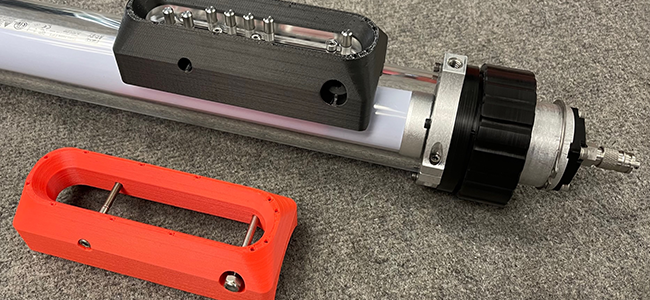17/02/22

Summary
Gates Underwater Products is a renowned American company producing underwater imaging systems dedicated to commercial divers, imaging professionals, marine researchers, salvage operators, and military personnel. Since 1969, when the company was founded, the “bulletproof” quality items have been noticed and appreciated not only by thousands of customers all over the world but also by established Hollywood producers, who have used them in their productions. Gates eagerly takes advantage of Zortrax 3D printing solutions in their work. See why and how Zortrax 3D printers are used by the acclaimed underwater housing developers and how they have benefited from supplementing 3D printing into their business.
The graphic illustrates the examples of Gates devices, manufactured with the use of Zortrax M200 3D printers.
Gates Underwater first recognized the huge potential of 3D printing for their business in 2015. This year, the first low cost FDM type printer was placed in their workshop. In the very first week, it occurred that the production of complex parts, usually taking weeks, now needed only hours to get into the hands of the designers. Having experienced the exceptional time and cost savings by themselves, Gates professionals were sure 3D printing technology was going to revolutionize their field.
The picture shows a prototype of a latest UT2 underwater lighting (on the left) and the final product (on the right) created with Zortrax 3D printers.
That’s why, two years later, the company turned to Zortrax as they acknowledged our global reach in the 3D printing field and the quality of the offered 3D printers. “Extensive research for a robust machine, quality printing, and solid customer support led us to Zortrax,” says John Ellerbrock, CEO of Gates Underwater Products. They knew they needed a machine that was truly reliable, versatile and advanced. Hence, their choice was Zortrax flagship desktop printer – M200. They loved it at Gates so much that, currently, there are four Zortrax 3D printers up and running at its headquarters. “The printers are great for their simplicity, reliability, print quality, and ease of maintenance. Zortrax and their dealers have been great with support, including a detailed online video series for maintenance and repair of all the printers available on their website,” John Ellerbrock enumerates.
A more technologically advanced equivalent of Zortrax M200 used by Gates, which is currently available on the market, is Zortrax M200 Plus. It has preserved its predecessor’s well-known features but has added some new qualities (such as, e.g. a touchscreen) to it as well.
Zortrax M200 Plus is a higher tech equivalent of Zortrax M200, currently available in our offer.
The main purpose Zortrax 3D printers serve at Gates is prototyping. During this phase, it is crucial for the creators to conduct evaluation, fit check, integrity testing, and functional check. All of these are easy with reliable machines at their disposal. Moreover, 3D printing lets them be super creative in prototyping. “The FDM process allows designers to think outside the box, creating parts that could not possibly be produced by CNC machining methods, but are readily created by 3D printing,” John Ellerbrock underlines. Next, the 3D printers are invaluable in production as well. Once the newly designed parts are classified as ‘complete’ or ‘released,’ they are stored on a network drive for general manufacturing.
Pro Explore camera housing is one of the examples of Gates products, where Zortrax 3D printers were used in prototyping.
The opportunity to express the unconstrained creativity in the prototyping phase is not the only benefit that 3D printing ensures. When asked about the biggest assets of this technology in their business, John Ellerbrock answers: significant time and cost reduction. „Naturally time savings equal cost savings. But the cost savings extend also to the material – that is, the use of Z-ABS filament instead of machined plastic or aluminum,” he notices.
The creators opt for Z-ABS filament for most of their projects mainly due to its durability and versatility. As for Z-SUITE settings, they vary from one project to another, yet prototype parts typically have 0.14-0.19 mm layer thickness with 30% infill, while a production part will have 0.09 mm layers and 50-80% infill.
The image depicts the protector for UT2 underwater lighting in Z-SUITE (left) and the same part on the platform after 3D printing process (right).
In the latest Gates’ project of an underwater lighting, Z-ABS was used in the prototyping phase. The target materials used in the production stage were aluminum and acetyl for sealing and lubricity purposes. The post-processing techniques are usually reduced to the minimum as they involve just some occasional acetone vapor bath, which was the case with the latest underwater lighting. In UT2 lighting, this 3D printed part allows Gates’ customers to select the final look of the device by picking a color of the 3D print.
The picture illustrates the 3D printed part in the UT2 lighting, which color can be changed according to the customer’s preferences.
The products in Gates’ offer that have been manufactured with the use of Zortrax M200 range from underwater lightings, like UT2 or GT14 to compact camera housings, such as Pro Explore, dedicated to traveling underwater professionals. All these items contain 3D printed parts in their final constructions.
As it is one of the best-recognized underwater housings manufacturers worldwide, it’s no wonder that Hollywood producers have been drawn to Gates for years. Their underwater products played a role in filming of such hits as “Games of Thrones,””Deadpool 2,” “Batman vs Superman,” “Resident Evil – the Final Chapter,” and “Outlander”! Many of the productions using Gates underwater gear, have been awarded with top prizes such as Oscars, Emmy’s and BAFTAs.